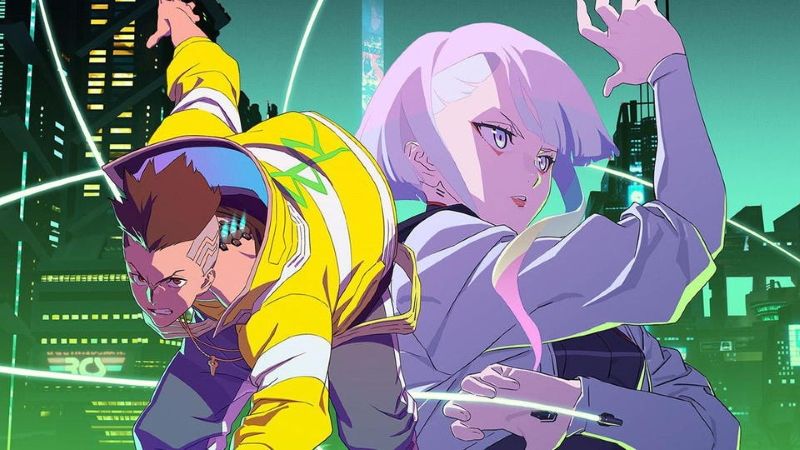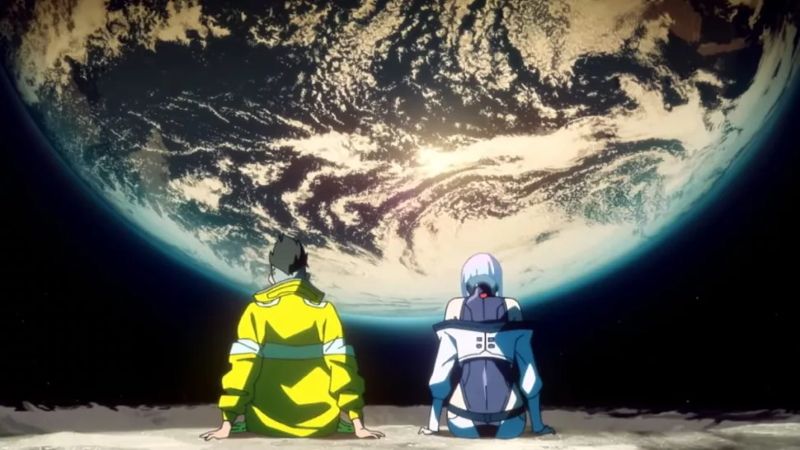Never mind the BSOD, here's Cyberpunk: Edgerunners
As a science fiction geek, I have a particular fondness for the cyberpunk genre. I only recently tried to seriously ask myself why after watching the new streaming hit Cyberpunk: Edgerunners. Here’s the thing: I have an aversion to “downer” stories where bad things constantly happen to people who don’t deserve it, and misdeeds that go unpunished. Fiction for me has to provide some escapism from the grimness of reality, so surely, I ought to be put off by media that trade in injustice and hopelessness?

I suspect that a lot of the appeal that cyberpunk has for me is rather shallow: aesthetically, it just looks cool. Extrapolating the excesses of our technological present has its own charms, even if the end results are rather pessimistic. I suspect that the “loss of humanity” aspect also has a sort-of dissociating effect, where the emotional moments are lost in the world-building. I sometimes think of the cityscapes as characters in their own right.
What about the thematic aspect, then, which is often concerned with the impact that technology has on us on a human level? Again, this is a rather bitter pill to swallow when you’re trying to escape from the anxiety of real life: do you really want to expose yourself to a fictional cautionary tale about why this stuff is bad when it’s staring you in the face every day?
I’m still trying to unpack the specific reasons for how I keep coming back to the genre, despite my brain wanting to look the other way (for instance: I never got far into the second season of Black Mirror). Despite being a bleak commentary on where our society could be going, I still think of cyberpunk as my personal televisual comfort food.
And make no mistake, Edgerunners IS bleak: for most of the cast, things Do Not End Well. Nobody can be trusted, opportunities are limited to all but the wealthy elite, and life for everyone else is often violent, painful and cruelly short. I was initially sceptical about how Studio Trigger could make it work: I’ve not played the associated games, but I have a clear idea in my head about the genre’s themes and aesthetics, and how Trigger’s prior output differs from that.
Part of the recipe for its success I think lies in how faithful it is to what “cyberpunk” means to its intended audience. This futuristic cityscape is reminiscent of Blade Runner, Bubblegum Crisis and the real-life neon glow of Tokyo and Hong Kong; the gritty everyday lives of the characters share a lot with the outcasts and small-time criminals of William Gibson’s Sprawl series of novels and short stories, and even the Raymond Chandler-esque crime fiction that preceded the genre entirely.
In terms of its reliance on tried-and-tested tropes though, I wasn’t particularly worried. It’s nice to see new concepts, but good entertainment usually just needs ideas that are articulated well. After all, Neal Stephenson’s Snow Crash is widely regarded as a pastiche yet at the same time is cited as one of the most influential cyberpunk novels. Even when it’s overtaken by time itself, as Blade Runner was, a futuristic vibe can become retro-futuristic (Blade Runner 2049 feels to me more like an alternate future in the first film’s fictional timeline than a prediction of what our own late 2040s will look like).
Edgerunners also puts the “punk” into cyberpunk. This is where director Hiroyuki Imaishi’s visual style takes this production and makes it his own…although it’s a pretty multicultural effort (the franchise was started by a Californian, the video games were produced by a studio in Poland, and the end theme features a song by a band from Scotland. The latter choice could be a coincidence, but Imaishi also used a Franz Ferdinand tune in the ending animation sequence for Paradise Kiss).
Typical cyberpunk is in part a futuristic re-imagining of hard-boiled film noir so makes use of moody synthesized music scores and restrained performances from its actors, but in this case there’s an addition of uncharacteristically frenetic, cartoonish expressiveness. The brisk and chaotic nature of the action serves to diffuse the worst of the shocking moments for me, because it never seems to linger on them: someone is dispatched in a sudden and savage way with a spray of gore and mangled limbs, and the scene is hurried along until the flashbacks hit later on.
Edgerunners consists of a series of bad decisions, but these are made by people trying to survive in a cruel and hostile environment without the luxury of grieving for lost loved ones or processing their trauma. As technology speeds up communication and amplifies existing inequalities, individual humans have to move faster to keep up. I do wonder whether “cyberpsychosis” is specific to people who take mechanical enhancement too far, or whether it’s an extreme manifestation of a social illness that’s endemic in Night City as a whole.
Rather than completely robbing the story of its all-important characterisation and underlying messages however, Imaishi’s approach heightens the emotional impact. I soon felt drawn into the rollercoaster ride where their world is colourful and unpredictable, and those rare moments where the story pauses for breath feel all the more meaningful because of that. It also reflects the lived experiences of the characters themselves: respite from the danger and misery is rare and death can hit you unexpectedly, so the moments of calm, reflection and irreverent humour are all the more precious.

Looking back on Imaishi’s back catalogue so far, I’m starting to think that this is a rather underrated aspect of his storytelling. The liveliness and not-a-single-frame-wasted visual style might define his work for many, but I’ve grown to appreciate his ability to know when to kick into overdrive and when to dial it back to deliver The Feels.
When I think of Gurren Lagann or Kill la Kill I don’t just think of their comic book excesses; what sticks in my memory are the larger-than-life characters, and Edgerunners has loads of them. We see the burden carried by Maine and the toll that it takes on him, both physically and psychologically; David and Lucy allow themselves to open up to each other, to have dreams and lofty ideals, despite their surroundings punishing selflessness and vulnerability at every turn; Rebecca comes across as a Melt-Banana album given (cybernetically-enhanced) human form and handed a pair of oversized shotguns.
If I have one criticism, it’s that I didn’t get to spend enough time with them. Perhaps extending the ten-part series to a more conventional twelve-plus episodes might have allowed for some more character development, but much like FLCL – the mini-series that defined this frenetically-paced anime style for me – it does at least avoid outstaying its welcome. Maybe in this context it’s more appropriate, as the old saying goes, to burn out than to fade away.
Cyberpunk: Edgerunners is currently streaming on Netflix
